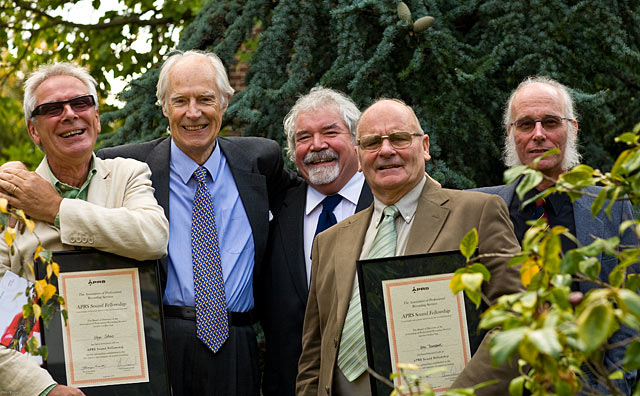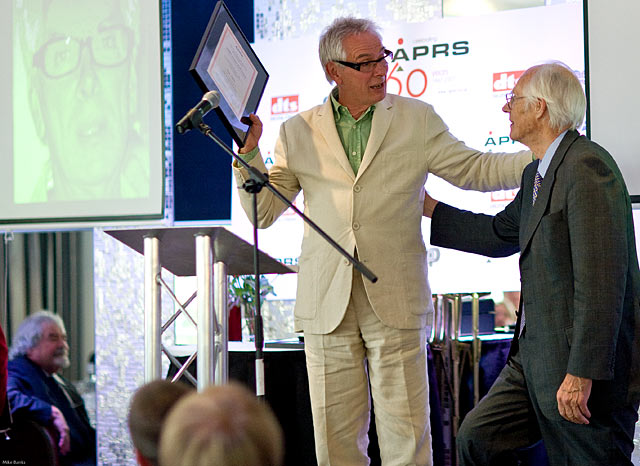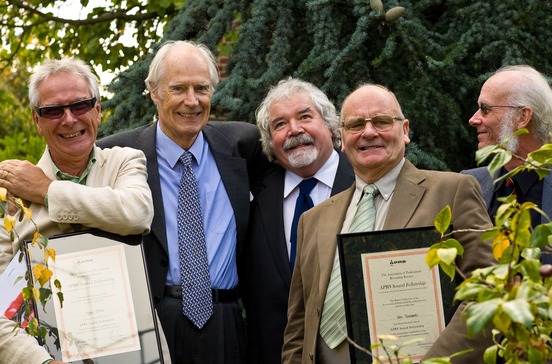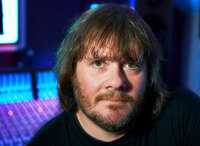Brief extract of Sir George Martin speaking at the 2009 APRS awards
 |
SIR GEORGE MARTIN Interviewed at Air Lyndhurst |
What does being chairman of AIR involve? How does your role manifest itself in terms of making decisions about the studios?
Well, it's 10 years since we started the studio, and my role has changed a little bit over the years. To be honest, I'm not needed as much as I was. I was very much needed when we built it, because I was a fundamental part of it - the design and development of the studios. In fact, it wouldn't have happened without me. But having done that, the staff we have here now are very good indeed, and the management here is superb. That's something we've built up over the years.
In terms of day-to-day work, I come in every week if I can for two or three days to keep in touch. And there's a management meeting every month, during which we're updated on the running of the studio and we discuss any problems - what we have to do in the way of refurbishing, new staff and so on. So I'm not very hands on, but of course technology comes up all the time.
With a studio like this, you have to keep at the cutting edge of technology. If you don't, you'll fall by the wayside. You have to watch the market, too. For example, post-production has been tremendously successful for us. We were aware that there was a need for this; we had rooms which were available that we could use for it; so we developed it.
But again, it's people that make it work, not technology. If you get the right people, you'll be OK. You can have the best gear in the world, but unless you've got a really good person dealing with it - and dealing with the client, of course - it doesn't mean a thing.

What have been the most telling technological changes at Air Lyndhurst over the past 10 years?
There have been various changes, but the detailed changes of equipment in the studios is really a question of keeping ahead of developments - making sure that your consoles and recording platforms are of the latest quality. But if you're going to spend half a million pounds on a new console, you've got to be sure you don't do it too often.
Digital editing has become the norm, of course. In the pop field, hard disk is standard. We use Pro Tools a great deal. It's only in the legitimate classical stuff that people still want analogue, and even there we do a lot of digital recording. I personally like analogue, and I like old-fashioned tape. But I use computers too, and I use hard disk recording sometimes.
It doesn't matter how many tracks you have to start with: in the end you've got to reduce it to just two, if it's stereo, or five and a bit if it's surround. You can have 124 tracks, but you've got to bring them down eventually and make sense of it.
Is surround sound the biggest thing since spliced bread (or stereo) - and should record companies be embracing 5.1 mixes and DVDA in a more positive manner?
5.1 has gained enormous popularity, and it's been helped by the development of home cinema and DVD. It isn't just the domain of the super-rich, as it used to be. A lot of people are aware that they can put a number of quite unobtrusive speakers in a room and make a tremendous difference to their home sound.
DVD is the fastest-developing medium of all time. However, I don't think that in terms of pure music - as opposed to movies - the market is slow. It's just different. I don't think surround sound is that important in the pop field. Impact is more important. Not many pop records are played in surround sound because most kids play them either on headphones or a boom-box. And the other key medium for pop is radio, so it's a different kind of market altogether.
So it's not that record companies are being slow to recognise 5.1 or DVDA - it's a matter of preference. A mono record, actually, packs more punch than a stereo one. And a stereo record packs more punch than 5.1. It's a question of impact - and kids like impact.
I suppose 5.1 captures a little bit of the excitement of a live performance. The Music For Montserrat video was mixed in surround, and it does sound good - but only because it reminds you of what the actual evening was like. For general pop music, I wouldn't say it was desirable.
There is much talk of the challenge to big studios from cheaper alternatives that get good results. What are the enduring qualities of the high-end commercial facility in the face of these challenges?
It's a question of gradual development. There are no great revolutions around the corner. What we're doing in this Hall is what people did 50 years ago: recording orchestras with very, very good sound, either allying it to film or just for the audio itself. The tools may have changed, but the music isn't all that different, really. Things are a bit slicker, but I don't think the basic requirements are going to change.
The effect of people on creativity will never change - people meeting together. If you're using Pro Tools in your own home environment, it's a lonely business. You may be enough of a genius to create a fantastic work of art purely by yourself; that's been known from Tubular Bells onwards.
But, in the main, people do like working with other people. If you work in a studio with a good engineer and a good producer - and with good musicians playing together rather than layering a cake all the time - something happens between those people. There's a kind of 'frisson' of creativity that's sparks off between one and another, and the production gets better as a result. It's the way I've always worked.
I've always loved the way something can happen out of the blue, and you think wow!. And you know that it wouldn't have happened if you'd just been by yourself in your own little room. So if you can provide the space in which that can happen, that's the enduring quality of your studio.
Air Lyndhurst has had enormous success with film projects - to what extent did you anticipate this when you were planning the complex?
It was entirely deliberate. When I first opened the studio, the first person to use it was Henry Mancini. He was doing a new Pink Panther film, and he'd heard that we were developing a new studio. He rang me and said, "Look, George, tell me honestly - what's the sound like?" I said it's fantastic, really great. And he said, "If I'm the first to use it, I am going to be a guinea pig, aren't I?"
I had to confess that we hadn't yet done a film session here. I didn't tell him that the building was still covered in scaffolding, and we hadn't done any sessions at all - but I wasn't lying! So I offered to produce the music free of charge if he came to Air Lyndhurst with the project, and I promised him that I would stake my reputation on him being pleased with the results.
So he came for two weeks, and everything went like clockwork. He was enormously pleased, and on the morning of the last day he turned round and said, "You know, George, you've embarrassed the hell out of me. Everything's gone so well I haven't got any more music to record - and we've got another day here!" And then he promised to loud-mouth about the studio all over Los Angeles.
And that's exactly what he did, and his word really started us off. From that moment on, we started getting big film scores here. If you get a satisfied client, they'll tell people about it. Yes, live acoustic recording has declined in mid-range studios, but there'll always be a demand for good halls - particularly with the quality of sound that we have here.
This hall has a beautiful ambience. It makes an orchestra sound really good. It's also controllable, which is terribly important. In sound terms, it's as good as Abbey Road Number One was - that's always my yardstick, I grew up there - and much more controllable. In fact, Abbey Road changed things to make their studio more controllable in order to compete with us.
Of all the studios in Europe, I guess we and Abbey Road are the two leaders. There are other big places: Watford Town Hall, Sony, not that many. Fortunately, film scores involving big orchestras have remained in fashion. All the onset of synthesizers and cheaper samplers of the '80s and '90s has not stopped Hollywood, at any rate, from demanding orchestras - some of them too big even for us.
Sometimes only Abbey Road can cope. If you want 120 musicians, it's pretty tough to do it in here. Ninety to a hundred is our limit. Nevertheless we get top sessions: we did Lord Of The Rings here; and Harry Potter, with John Williams. John Williams likes to use more than 100 people, so it was a bit tight. Moulin Rouge was another of ours.
When John Williams was here, I said to him that one of the things I loved most was the magic that comes from live musicians rather than synthesizers. And that's what he does: he paints a beautiful orchestral picture with conventional musicians.
When we moved from Oxford Circus it was strictly speaking because our lease ran out. But, also, we'd passed our sell-by date. It was the wrong venue for a good studio. Oxford Circus had changed over 21 years, and it was the wrong place to be. We were quite glad to be out of there, but in moving we were faced with the problem of mounting costs and so on.
At one point I thought Air would cease to exist. I said to my partners that we would either go up or down in standards, and I wasn't going to go down. So going up meant a bigger place with grander ambitions than we'd had before. When we found this place I said, well, if we do this, we've got to go into film. It was quite deliberate.
Wearing your businessman's hat, how seriously do you take the threat of another recession - and what impact do you think this will have on the music and film industry in general and Air Lyndhurst in particular?
The whole world seems to be in recession at the moment, but fortunately England doesn't seem to be doing too badly. Certainly Air Lyndhurst isn't doing too badly. But the spectre of vast unemployment and lack of investment hangs over every businessman, and will affect every industry whether you're making food products or music.
We have to have clients coming here, spending money and making music for films - or doing post-production work for television - in order to keep alive. If that demand dries up, we will suffer. Having said that, I don't think it will dry up. Even in times of recession, it is history that people do like to be entertained. Certainly, television programmes will continue to be made, and films will continue to be made.
There may be more pressure on us - on our prices, and so on - which may make life more difficult, but I'm not too pessimistic about it. If we do have a bad recession, I think we're good enough to weather it.
Playing Devil's advocate, would it have been easier to make Sgt Pepper today than it was in 1967?
It would probably have been easier today, but it probably wouldn't have turned out as well. I think the discipline of 4-track in 1967 made us do things - certainly made me do things - that you wouldn't do today. And it made The Beatles perform better. They had to perform. They had to be good in order to concentrate on small tracks at a time.
There wasn't the luxury of saying, well, we can patch that later. We couldn't do that; we had to work things to a conclusion as we went along. Particularly when you're mixing down from one 4-track to another, you solidify everything that has gone before. You couldn't go back, otherwise you'd destroy everything that you were doing. That discipline, and that forward-thinking, I think was part of the success of Sgt Pepper.
Having to do that worked out very much in our favour. It sounds as though we chose to do that, but of course we didn't. We used only the tools that were available, and that's all that was available. I think if I'd had 72 tracks, or whatever, in those days, I would have used them. But I'm not sorry that I didn't!
Moving on to the music industry in general, do you think the UK is still perceived as a place of boundless talent or do you think we are being eclipsed by Europe and the US?
A difficult one, this, because it keeps changing. You get a tremendous upsurge of talent in one place or another, and you get a run of luck, almost. The English and the American markets are very different. America is like Europe, with many localised markets in which someone can be enormously important in just one, and mean nothing in any other. It's only when they all coagulate that you get a national hit.
You've got so many different genres of talent and music out there, which we don't really have here. We don't have a broad country music base here, for example. But we do actually have tremendous talent, and we have a reputation for it worldwide. Fortunately, Governments encourage it now - they used not to.
We're getting quite a bit of support in the music business, in many ways, from the current Government. I think the future for Britain is very good. We do get listened to. Blair is a bit of a musician, isn't he? He tries to play his guitar, at least. He can play, but I think Dave Gilmour is a bit better!

Pictured: Glyn Johns receives an APRS award from George Martin
Do you think it is harder or easier for young bands to break into the business these days?
It's harder, because there are so many of them and there's so much competition. It's harder, too, because the record companies have become a lot more corporate: everything is done by consensus and committees. There isn't the individual flair within the record companies to recognise talent. It's quite possible for a band to keep going for ages and not get recognised at all.
One of the reasons, of course, is because it's so expensive. If I'm the head of Warner Bros, or whatever, and I think a tape is fantastic and I want to sign the act, I'm committing my company to a million pounds - just by doing that. There's no point in signing anybody unless you're really going to develop them into a class act. You have to guarantee at least one album, which means videos and all that goes with it. A million pounds is the minimum. It's heavy stuff, and they don't like doing it.
It is more or less true that producers are now delivering finished masters to get acts noticed. I've given my weight to an organisation in America called Garageband.com - an internet thing. I think it's a very good way of getting talent exposed, for the record companies to pick up. Basically, it's a web site where young musicians are invited to send in their masters - not really demos - to be played over the web, and people are invited to vote on them.
So every week you get a kind of chart, obviously vetted to a certain extent. Over a period it gets aggregated, and the top choice is guaranteed $25,000 towards making an album - and this is then introduced to the big boys in the recording business. It acts as a kind of A&R business, giving people exposure. The only other way is the eternal trail round clubs and venues, plodding away and hoping someone will pick you up. It's hard work.
It's not just the sound now, either. It's what you look like, how you move and all the packaging that goes with it. Unless you look good on television, you're not going to sell records - it's as simple as that.
Do you think record labels are doing enough to promote and sustain the long-term careers of their artists?
This, again, is a tough one. The broad answer is no, but then it's human nature that if you have a young star who has a sudden, meteoric rise, that person becomes very conscious of their power and becomes very demanding. Consequently, the profit ratio of the record company diminishes as the star gains status.
A good example of that recently was Mariah Carey, who became so costly that they would give millions of pounds to get rid of her - which is a ludicrous situation. Certainly the ideal - which is very rarely followed - is to nurture young talent, encourage them, and work with them to develop their talent into a long-standing relationship. That requires understanding on both sides.
Most people want fame and fortune. I don't think there are many genuine, dedicated music talents who don't give a damn about whether they'll ever make a success or not. Everyone wants their piece of the action, in America as well as here. Robbie Williams hasn't really made it in the States, has he?
In the light of shrinking record company profits, how do you see the future of the UK music industry?
This is a business where word of mouth is more important than anything else. You can spend a fortune on advertisements, but it doesn't bring in anything at all. It's your reputation, and the success you have. We believe that if you have a good client, and you look after him, he will be pleased enough to go and boast about you to other people.
But the record business is in a parlous state. They don't want to waste money - they don't even want to spend money. It's a very hard-nosed business, and you've almost got an accountant looking over your shoulder every time you press the record button on the tape machine. I don't see that as a good future for the industry at all.
What about the internet and new media? What impact do you believe this will have on the way in which music is recorded, distributed, marketed, etc - do you see the Internet and downloadable music files as a good or bad thing?
Well, I've already mentioned the idea of Garageband.com, which I think is a good one in terms of finding new talent. The question of whether the internet is a good or bad thing is completely immaterial, because it's here whether we like it or not. It's going to stay, and the physical record is going to be less important than it has been in the past.
Downloadable material is going to increase. In fact, I perceive that within the next five to ten years we will be able to dial into our homes any particular master you want for a sign-up fee. If you want to listen to the newest sounds around, you'll just press a button or dial in a code and you'll get the file downloaded - without actually having a piece of plastic in your hand.
That will unquestionably come, so the music industry has got to find ways of controlling it. We'll still have records - discs - of one sort or another, but I'm quite certain that they will take a lesser role.
Doesn't that new access apply even more to the archives? - in fact, the interest in the history of pop and rock recordings is greater than it has ever been?
That's quite right - in fact, there is a classical record business now in the pop industry. Just as we used to play Beethoven, Brahms and Tchaikovsky, we tend now to look back and play The Beach Boys, The Who and The Beatles. They are 'the classics'. There is a kind of interest in the past that never used to exist; people used to move on to the next thing.
It's a sign of the changing audience. Audiences have changed enormously over the past few years, and heaven knows what audiences will be like in 10 years' time. I think it's going to become increasingly difficult for classical music to continue to be written. We tend to think of it in terms of the score for Titanic or Star Wars, rather than Mahler or Sibelius.
Most symphony concerts involve music written over 50 or 60 years ago, but pop music is becoming the new classical.
The Association of Independent Recordings was symbiotic with artists writing their own material and producers defining their own terms. It defined the beginning of an era. Is that era now coming to a close?
Our motto was, a studio built by producers for producers. It is, of course, the end of an era, because of the four people who started AIR, I'm the only one left. And yet, I'm the eldest! I thought the youngsters would carry it on, but they've fallen by the wayside.
But if that era is coming to a close, I don't think the basic principle will. The producers who come to use this studio like the ambience that has been created with the producer in mind. We started that because, in the '60s, studios had been built for engineers more than anything else. Quite often they were designed by engineers who had no idea of what the producers' requirements were.
In fact, EMI actually presented us with a new console for Number Two studio at Abbey Road, which was designed by the EMI engineers. It was 8-channel, and it had a monitor panel with eight monitor channels for the producer. But because they wanted to be very symmetrical, they put four of the monitors over on one side and four on the other - at the extreme opposite ends. You couldn't actually touch both at the same time! It was absolute nonsense, really - but they never thought about it. So the thinking behind this studio is still very much the thinking that people appreciate.
Artists will always want to write their own material, too. They have big egos, and they prefer to have a hit written by themselves than somebody else - no matter who it is. Some will only record their own material. Others who need hit songs supplying to them from time to time still want to have their own. I don't think that will change.
If you could have done anything else, other than producing, what would it have been?
Aircraft design. I used to love model aircraft, and I was in the Fleet Air Arm. Too late now!
Watch our video interview with Giles Martin at Air Studios.




